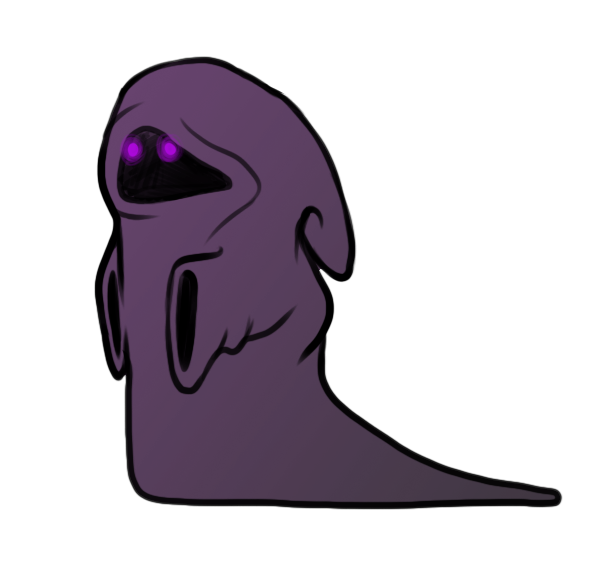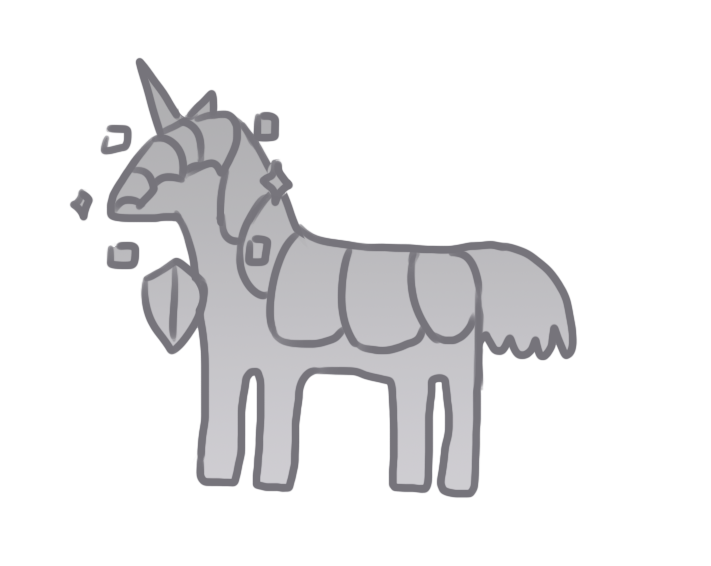Human Culture
Human customs and worship in Unicornia revolves around their unicorns and the deities that come with their beliefs. They host festivals to honour their gods and goddesses every year, and most humans tend to worship one or more of their favoured deities daily.
Human Unicornia is a hierarchical society, with a monarchy at the top and the lowly beggar at the bottom. Slavery is illegal in Unicornia under King Lancelet’s rule, although the previous King saw matters differently. Since it is recently abolished, some still dabble in it. A poor man might sell himself to a rich family or an investor, so that he might be fed and have somewhere to sleep.
Unicornia is a kingdom reeling from the effects of war, only now starting to bounce back from hard times due to the lucrative trade deals set up via the waystation by King Lancelet. Unicornians are a very proud people, and many survivors look back to the great empire they once were and the bustling old capital that now lies in ruins.
Unicornian Humans weren’t always worshipping the deities of the unicorns, the humans who first migrated from across the sea took with them the belief of an old god, one that dwelled deep in the ocean but also high in the sky, buried in the mountains and speaking to them through the howling wind and the creaking trees. Their god was a powerful god, and most humans feared it. It is from this old god that human magic is found, although it is extremely rare since barely anyone worships the Old One. No one knows what the original humans called it, since they adopted the Unicorn deities as soon as they had settled in their new homeland.
Unicorn Culture
Unicorns have been in Unicornia since the beginning. They were the original rulers of the lush Kingdom, tending nature with their powerful magic and engaging in artistic endeavours like music, poetry and storytelling. Since they had unlimited lifespans, they could spend hundreds of years weaving nets of intricate magics that still echo into the current time. It is said the deities that current unicorns and humans worship were the rulers of old Unicornia, with their subjects showing their respects at the shrines for each of them.
Nowadays the unicorns are but a shadow of their former selves. Their deep intelligence has been reduced to being a bit smarter than a normal horse, and their magic is much weaker, although there are talented and powerful unicorns that are starting to turn that around. Human historians theorise that it is closeness and relations with humans that has somehow dumbed the unicorns down from their original glory.
They do retain a strong sense of pride and “holier than thou” attitude, believing most other beings to be beneath them and “less pure”. This extends to any unicorns that are “wrong” such as boucles with defects or ones that display particularly strange behaviours. Unicorns overall have a much less accepting culture than humans do.
Gods and Deities
The Old One

The original god of the humans, before they came to Unicornia. The Old One’s real name is unknown, as it has been lost in time, and not much is known of its uses and cultural aspects.
Scholars have found evidence that have led them to believe that the Old One was feared more than anything however, and the Unicornia humans gladly accepted the unicorns as their new deities once the first unicorn revealed themself to them.
The old god is described in early writings as something without form, a powerful force that could move mountains and cause the sea to leap on land. Some scholars believe that a tall hooded figure in early human art is a depiction of The Old One.
The Old One is said to be the origin of human magic, powers that are easily twisted by greed and anger. Human mages are therefore extremely rare, and are viewed with much suspicion. Only mages that are not of Unicornian descent are trusted fully, as their powers are derived from something else in their homeworlds.
Lux, Deity of Light, the sun and the day (She/Her)
Lux is the embodiment of light and the warmth of day; depicted as a long-haired, fair unicorn with braids along her neck and sun-like symbols around her body. She is a proud and egotistical goddess, believing herself to be somehow better than all the other deities. She does harbour strong motherly feelings towards the mortal humans and unicorns however, watching over them closely.
Lux has a thousand year old rivalry with her twin brother, Nox, the deity of Darkness, the moon and the night.

Nox, Deity of Darkness, the moon and the night (He/Him)

Nox is the father of night and the usher of restful times; he is depicted as a slim, curly stallion with flowing hair, surrounded by celestial symbols and with a long, curved horn. He is quiet, lonely and withdrawn. He favours logic and philosophy, standing behind those who bury themselves in books and research.
Nox has a rivalry with his twin sister, Lux.
He is said to be the partner of Sanguis, the deity of Blood and Mourning.
Aqua, Deity of Water, the sea and rebirth (She/Her)
Aqua is the mother of the sea, a temperamental being driven simply by her whims. She is depicted as a hippocampi with a swirled, lengthy horn, a mane of tentacles as well as other fish-like features. A symbol for water shines above her head.
She can be very fickle in her ways, and gaining her favour doesn’t necessarily mean being safe from her destructive powers. Many adventurers have lost their lives at sea, believing that they were protected from the stormy waters. She is believed to provide rebirth and life though, as her element is the basis for growth.

Caeli, Deity of Air, laughter and jokes (They/Them)

Caeli is responsible for innocent gusts of wind but also powerful storms. They’re also quite playful, and constantly filled with laughter. They are depicted as a fluffy ball with several wings, a swirled horn and a misty, cloudlike mane.
They tend to favour those that are open minded and adventurous.
Caeli has had a relationship with most of the other deities, as they’re very free spirited and fun-loving.
Ignis, Deity of Fire, ashes and rebirth (They/Them)
Ignis is a destructive force to be reckoned with, but also a warm and protective creature. They are depicted as draconic, with large bat-like wings and their mane and tail on fire.
Ignis favours mothers and those who work in the heat of fires. They are also like Aqua a symbol of rebirth, as life grows back from the ashes.
Ignis is the sibling of Aqua, the goddess of water.

Surculus, Deity of Earth, fertility and peace (They/Them)

Surculus is best described as a calm and collected, ancient being. They are depicted as covered with thick patches of foliage with a tree growing out of their back. Their face is mostly covered in leaves, vines and flowers.
Surculus favour gardeners, farmers and those who toil for the wellbeing of nature. Surculus is most pleased when there is peace around them, and tend to withdraw when there are conflicts.
Surculus is the sibling of Saxum, the god of stone.
Crustallus, Deity of Ice, winter and focus (He/Him)
Crustallus is as cool as the ice and snow that surrounds his very being. He is depicted as big and strong, covered in thick, long hair and with a giant rhinoceros-like horn made of ice.
He favours scholars and those who keep their memories and minds sharp. Crustallus has a voice that sounds like creaking ice. He is steadfast in his beliefs and never backs down from a fight.
Crustallus is the lover of Aqua, the goddess of water.

Saxum, Deity of Stone, adventure and thrill (He/Him)

Saxum is a lover of the hunt and a thrill seeker. He loves treasure, danger and undiscovered places. He’s depicted as covered in stone and precious glimmering gems. He is as mysterious and imposing as a mountain at first glance, but is a steadfast friend and ally to those he trusts.
Saxum favours treasure seekers and adventurers, those who explore ancient ruins and new worlds. He gets bored easily and is therefore always planning on his next adventure.
Saxum is the sibling of Surculus, the deity of earth. He is the father of Aes, the deity of metal.
Aes, Deity of Metal, beauty and riches (They/Them)
Aes is a stoic, handsome hero. They are depicted as an armoured, stocky unicorn made out of several different molten metals. Their horn is a shining golden sword.
They favour those who seek wealth and beauty, both external and internal. They are famously loyal and protective, chivalrous to a dangerous degree as they love throwing themselves into battle for fair maidens and beautiful gentlemen.
Aes is the child of Saxum, the god of stone.

Sanguis, Deity of Blood, love and mourning (They/Them)

Sanguis is a passionate being full of love and understanding. They are depicted as clear with blue and red veins of blood running through their body. They are often a misunderstood deity with younger generations, due to their main shrine being in a dangerous place.
Sanguis favours passionate lovers, healers and caretakers. They’re particularly fond of doctors and nurses who risk their own lives curing dangerous diseases.
Sanguis is said to be the partner of Nox, the god of Darkness.
Fulmen, Deity of Electricity, storms and battle (He/Him)
Fulmen is strong and battle-hardened, determined and quick to anger. He is depicted as if he is made of lightning, with a mane and tail of electricity and a horn shaped like a lightning bolt.
He favours knights, warriors and chivalrous types. When Fulmen speaks, loud thunder erupts around him. He is the most aggressive of the deities, although he does not deny his faults.
Fulmen has a slightly antagonistic relationship with most other deities, although he does have a soft spot for Caeli, the deity of Air.

Umbra, Deity of Illusion, magic and secrets (She/Her)

Umbra is a seductive being, and easily wraps anyone around her hooves. She is depicted as a slender mare with curly, wild hair and her body splitting into clones of herself. Her form is never still, always shifting into different shapes of herself as she moves.
She favours mages and scholars of forgotten arts. She is an enthusiast of the unknown and mysterious herself, and has a large collection of curious artifacts.
Umbra is the sister of Animo, deity of telepathy, Tempus, god of time and Dormito, goddess of Dreams.
Dormito, Deity of Dreams, hope and rest (She/Her)
Dormito watches over anything that sleeps, giving them pleasant dreams and a peaceful rest. She is depicted as cloudy with clouds of dreams floating around her, always with her eyes closed. In her mind she creates her own worlds, and loves exploring them instead of doing anything serious.
She favours dreamers and optimists, as well as creative, sensitive souls. She is very much a dreamer herself, always drifting into sleep. Dormito is impossible to have a complete conversation with, as she always falls asleep eventually.
Dormito is the sister of Umbra, goddess of Illusion, Animo, deity of Telepathy and Tempus, god of time. She is also the lover of Aedifex, deity of Creation.

Tempus, Deity of Time, wisdom and memories (He/Him)

Tempus is best described as an incredibly old being, he keeps the memories of every being in his mind, and is wiser than any of the other deities (according to himself). Tempus is depicted as a tall unicorn with a very long beard, wearing a big, worn and pointy hat.
He favours old, wise spirits and those who hunger for knowledge. Despite being the god of memories he is known for being very forgetful, most likely due to the sheer amount of memories and knowledge that he possesses.
Tempus is the brother of Dormito, goddess of dreams, Umbra, goddess of Illusion and Animo, deity of Telepathy.
Animo, Deity of Telepathy, the mind and body (They/Them)
Animo is constantly unfocused, their mind shifting between infinite personalities. They are depicted as a bald unicorn with unfocused eyes and waves of energy emanating from their head. Animo has a curled tail and their horn sometimes floats a small distance from their forehead.
They favour anyone that devote themselves to them, as they are in essence everyone. Objects like to float around Animo when they are present, which annoys a lot of the other deities. Especially Umbra and her precious objects.
Animo is the sibling of Dormito, goddess of Dreams, Umbra, goddess of Illusion and Tempus, god of Time.

Aedifex, Deity of Creation, beasts and worlds (They/Them)

Aedifex is a jokester and the life of the party. They do what they want always, a true trickster. Aedifex is depicted as a short but stocky unicorn with a lion’s mane made out of leaves and lion front paws. They have a see-through stomach were sea-life swim around, and are surrounded by land living creatures, including a platypus friend that they wear as a hat.
Aedifex favours wild souls and party-animals, as well as people who love creating. Aedifex is a master of annoying and pranking the other deities, and loves hanging around when they’re trying to do important stuff.
Aedifex is the lover of Dormito, goddess of dreams.
